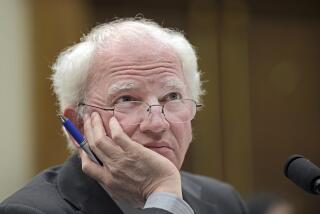State Bar Urges 1-Year Suspension for Lawyer
- Share via
Concluding that Stephen Yagman mishandled various financial aspects of a case, a state bar panel has recommended that the controversial Venice attorney be suspended from practice for a year.
The panel, expanding on a decision by a state bar court judge, found that Yagman had, among other things, failed to inform his clients of a settlement offer, “entered into an illegal fee agreement and collected an unconscionable fee,” and failed to promptly pay clients their jury award.
Yagman can appeal the decision to the state Supreme Court. Even if the justices declined to hear the case, it would be months before the suspension took effect.
The allegations stem from a 1992 lawsuit against the Los Angeles Police Department in which Yagman represented the families of three robbers killed during a Sunland gun battle with police, along with the lone survivor, who was imprisoned after the shootout.
The state bar’s review department credited Yagman for “a superlative performance” in the case. But it took him to task for collecting a $19,800 contingency fee from his clients’ $44,000 jury award--on top of the $378,175 in attorney fees awarded him by the trial court.
Had the trial judge known of Yagman’s contingency agreement with his clients, the jurist would have subtracted the $19,800 from the attorney’s fees, the review panel wrote in a 58-page decision filed Dec. 31 in Los Angeles. The fact that Yagman did not inform the judge of the agreement and then took the contingency sum amounted to “moral turpitude,” the review panel stated.
After costs were deducted from the jury award, each client was left with $810.66. And then, the department found, it took too long for Yagman to get the money to them.
Calling the decision “appalling,” Arthur L. Margolis, Yagman’s lawyer, said the review panel went beyond the initial charges, finding Yagman guilty of things he was not initially accused of. Margolis said he did not know if the decision would be appealed.
Yagman has argued that it was legal for him to obtain contingency and court-awarded fees. He has said he never saw a city letter offering to settle the case and a related lawsuit he was handling. As for the delay in conveying the clients’ award, Margolis conceded that “it took too long. His bookkeeping was not good.”
More to Read
Sign up for Essential California
The most important California stories and recommendations in your inbox every morning.
You may occasionally receive promotional content from the Los Angeles Times.













